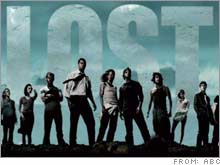|
Commercials get 'Lost'
Can promotions like ABC's "Lost Experience" game keep viewers and advertisers happy?
NEW YORK (CNNMoney.com) - ABC's cult favorite "Lost" ended its second season on Wednesday night in typically frustrating fashion. Plenty of questions were answered but many more were raised for loyal viewers, who now have to wait until September for new episodes.
Fortunately for them, the show's producers have devised an elaborate interactive game called the "Lost Experience" that involves a bunch of bizarre Web sites providing more about the mythology behind the hit show. But this game is more than just a way for "Lost" nerds (like yours truly) to keep themselves occupied during the summer. It's also a way for ABC to try and keep viewers from fast-forwarding through commercials and milk more advertising dollars out of the show. And now a word from our sponsor
For the past four weeks, ABC has included an ad for the fictitious Hanso Foundation during commercial breaks on "Lost." These ads have featured phone numbers and Web sites that viewers need to check out for more clues about the game. But a closer look at the ads and the game itself show that there are actually some marketing tie-ins. The Hanso "commercials" have actually featured small print showing that they are paid for by well-known corporations. The labyrinthine network of "Lost Experience" web sites includes references to brands such as Coca-Cola's (Research) Sprite, DaimlerChrysler's (Research) Jeep, Verizon Wireless and Monster.com. Mike Benson, senior vice president of marketing for ABC, said that the decision to include real companies in the game was a bid to satisfy marketers who need new methods to reach viewers. "Our partners see it as an innovative, different way to approach potential customers by becoming part of the story," he said. So the question that begs to be asked is will the "Lost Experience" actually be an effective marketing tool for advertisers that are tired of seeing their 30-second spots skipped by viewers with a digital video recorder and an itchy remote-control trigger finger? "Advertisers are starting to think more like a programmer. How do I create content that people will watch?" said Tracey Scheppach, vice president and video innovations director for Starcom USA, a media buying firm. But ABC isn't the only network experimenting with games to keep viewers watching commercials. CBS (Research) announced last week that it is partnering with reality guru Mark Burnett and AOL, the online portal owned by Time Warner (Research), on a promotion called Gold Rush this fall. (Time Warner also owns CNNMoney.com.) Viewers will be able to find clues during CBS shows and commercials, as well as other forms of media, that will help them identify where more than $2 million's worth of gold is hidden in the U.S. And the new CW network, created from the merger of CBS' UPN and Time Warner's WB, showed advertisers last week a concept that it called "content wraps": blocks of commercial time during shows that actually tell a brief story and can include product placement. Innovative or annoying?
Whether or not these novel ways of advertising will actually work remains to be seen but it's clear that the TV networks and marketers have to do something to combat the growing tendency of DVR-owning couch potatoes to skip ads. "This is an attempt by media companies to grab hold of a market they are losing control of," said Doug Ryan, chief marketing officer of Y&R Chicago, a subsidiary of ad agency Young & Rubicam. The big risk that networks and advertisers may face is that they irritate audiences. "Lost" fans for example apparently have an insatiable appetite for more clues about the show. To that end, "Bad Twin" a novel supposedly written by one of the passengers on the doomed plane in the show is currently among the top 50 best-selling books on both Amazon.com and Barnesandnoble.com. The book was published by Hyperion, which, like ABC, is owned by Walt Disney (Research). But do fans want more information packaged alongside messages telling them to "Obey their Thirst?" One of the "Lost Experience" sites is called subLYMONal, which is a reference to the so-called lemon-lime (hence lymon) taste of Sprite. "This blends into entertainment and product integration," said Scheppach. "I would hate to see it forced, where advertising feels unnatural in terms of the viewer experience. How deeply can you embed advertising messages in 'Lost' programming?" Brian Wieser, vice president and director of industry analysis with MAGNA Global USA, a media buying firm, said that sponsored programming during commercials could work as long as it's entertaining. "If it's creative, fun and novel it will get viewers' attention. It will definitely add to the engagement for people watching TV without DVRs and maybe it will deter people with DVRs from skipping commercials," Wieser said. But Adam Hanft, founder and CEO of Hanft Unlimited, branding and advertising consulting firm, is skeptical. He said that marketers need to tread carefully and that things like "The Lost Experience" and "Gold Rush" could backfire. "The gimmickry of it is so on the surface that it may alienate consumers. It shows how desperate traditional advertisers are to get people to watch their commercials," he said. Still, ABC's Benson is not concerned about any viewer backlash about the mention of brand names in the "Lost Experience" since advertising is just a fact of life that consumers have come to accept. "We are trying to grow the audience for the show in a way that is ultimately compelling and entertaining to the audience. People can be cynical about the ads but the show wouldn't be what it is if it didn't have advertisers running commercials," he said. ----------------- TiVo is the elephant in the TV room. Click here. ABC's success has brought the magic back to Disney. Click here.
The reporter of this story owns shares of Time Warner through his company's 401(k) plan. |
|


